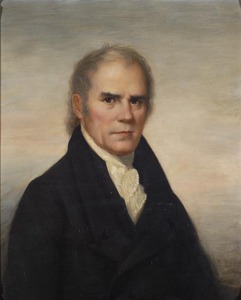The other main figure in this story is Julius Deming (1755–1838, shown here). Born in Lyme, Connecticut, Deming became a captain of cavalry under his cousin Col. Henry Champion and then, also under cousin Henry, an army commissary at Litchfield.
As the war ended, Deming remained in Litchfield and set himself up as a merchant. He married Dorothy Champion, cousin Henry’s daughter. (Another daughter was Deborah Champion, and I wrote about her legend back in 2014.)
For business Deming traveled to London, traded with China, and formed partnerships with prominent men like Benjamin Tallmadge and Oliver Wolcott. He grew richer. He became the local magistrate and served in some state and county offices, though his family understood him not to enjoy politics. (This story suggests he had strong feelings about politics nonetheless.)
Among the businesses Deming invested in was a paper mill, where he hired Elisha Horton as his manager. One source tells me Horton started work at the Litchfield paper mill in the early 1790s, the other that he started work for Deming in the early 1800s. Maybe there were two mills, or maybe Deming bought a mill where Horton was already working for the previous owner.
The 1790s and 1800s of course saw the rise of party politics in the U.S. of A. New England Federalists like Julius Deming were shocked when Thomas Jefferson won the Presidency in 1800 and his allies made inroads in their region. Litchfield had two newspapers keeping an eye on each other: the Litchfield Monitor (Federalist) and the Witness (Republican).
By September 1805, if not before, Deming was in a feud with Selleck Osborn (1783–1826), the young publisher of the Witness. There was a dispute over coverage of a lawsuit involving Tallmadge and Wolcott. Then on 9 October the Witness published an article headlined “Reign of Terror” reporting that on the recent Election Day Deming had tried to intimidate a Republican voter.
On 11 December the Witness’s last piece of local news, festooned with a pointing hand, was:
Yesterday the Editor and Printer of the WITNESS, were indicted by the State’s attorney, for an alledged libel against Julius Deming, Esq.That case hinged on Deming’s political methods. And when it went to court, a key witness was Elisha Horton.
TOMORROW: What Elisha Horton wanted to say.

No comments:
Post a Comment